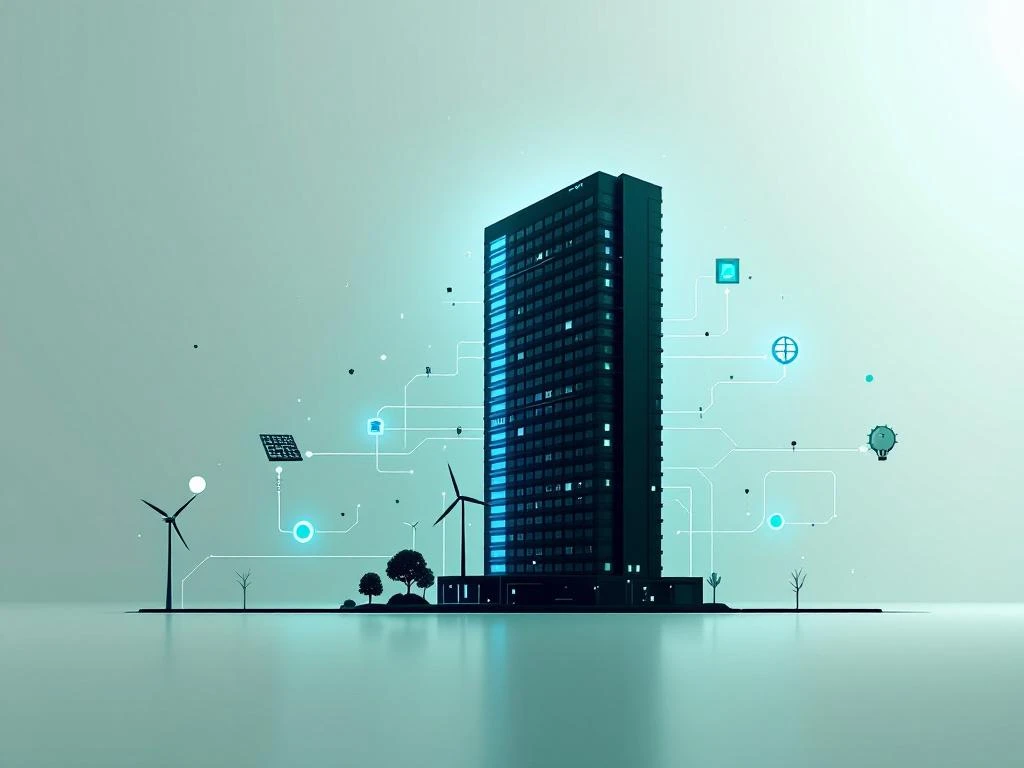
Andres Fellenberg Van der Molen
Director at Green Partner Europe | Hotels Specialist | Sustainability | Energy Efficiency | Circular Economy | Zero Waste | CSR | ESG | SDG

How can AI and smart energy systems reduce my hotel's energy costs?
AI energy systems and smart building technology can significantly reduce hotel energy costs by automatically optimising heating, cooling, lighting, and other energy-consuming systems based on real-time data analysis. These intelligent systems use machine learning algorithms to predict occupancy patterns and adjust energy consumption accordingly, typically reducing overall energy costs by substantial amounts whilst improving guest comfort and supporting sustainable hospitality practices.
Understanding AI-powered energy solutions for hotels
AI-powered energy solutions represent a transformative approach to hotel energy management, combining artificial intelligence with smart building technology to create comprehensive optimisation systems. These solutions integrate seamlessly with existing hotel infrastructure through IoT sensors, automated controls, and advanced monitoring devices.
The technology works by collecting continuous data streams from various hotel systems including HVAC units, lighting circuits, water heating systems, and guest room equipment. Machine learning algorithms then analyse this information alongside external factors such as weather patterns, seasonal trends, and booking data to make intelligent energy decisions.
Modern smart energy hotel systems can communicate with existing building management systems, making implementation more straightforward than traditional retrofits. The integration process typically involves installing smart sensors, upgrading control systems, and implementing cloud-based analytics platforms that provide real-time insights and automated adjustments.
What are smart energy systems and how do they work in hotels?
Smart energy systems in hotels comprise interconnected devices and software that monitor, analyse, and control energy consumption across all hotel operations. These systems utilise IoT sensors placed throughout the property to gather real-time data on energy usage, occupancy levels, and environmental conditions.
The core components include smart thermostats, occupancy sensors, lighting controllers, water flow monitors, and centralised management software. These devices communicate through wireless networks, creating a comprehensive energy management ecosystem that responds automatically to changing conditions.
Data collection occurs continuously, with sensors monitoring everything from room occupancy to outdoor temperature fluctuations. The system processes this information through advanced algorithms that identify patterns and inefficiencies, then automatically adjusts settings to optimise energy consumption without compromising guest comfort.
| System Component | Function | Energy Impact |
|---|---|---|
| IoT Sensors | Monitor occupancy and environmental conditions | Prevents energy waste in unoccupied areas |
| Smart Controllers | Automate HVAC and lighting adjustments | Optimises energy use based on demand |
| Analytics Platform | Processes data and identifies patterns | Enables predictive energy management |
| Automated Systems | Execute energy-saving actions | Reduces manual oversight requirements |
How does AI predict and optimize hotel energy consumption?
AI systems predict hotel energy consumption by analysing historical usage patterns, occupancy data, weather forecasts, and seasonal trends through sophisticated machine learning algorithms. These predictions enable proactive energy management rather than reactive adjustments.
The prediction process begins with data collection from multiple sources including booking systems, weather services, and energy meters. Machine learning models identify correlations between different variables, such as how outdoor temperature affects HVAC demand or how occupancy rates influence hot water usage.
Optimisation occurs through continuous learning and adjustment. The AI system monitors the effectiveness of its energy decisions and refines its algorithms accordingly. For example, it might learn that reducing corridor lighting by specific percentages during certain hours maintains safety whilst achieving energy savings.
Advanced systems can predict energy demand several days in advance, allowing hotels to participate in demand response programmes and take advantage of variable energy pricing. This predictive capability is particularly valuable for managing peak demand charges and optimising energy procurement strategies.
Which hotel systems benefit most from AI energy management?
HVAC systems typically show the greatest potential for energy savings through AI management, as they often account for the largest portion of a hotel’s energy consumption. Smart climate control can adjust temperatures based on occupancy predictions and weather conditions whilst maintaining guest comfort standards.
Lighting systems benefit significantly from intelligent controls that adjust brightness levels and automatically switch off lights in unoccupied areas. Advanced systems can even adjust colour temperature throughout the day to enhance guest experience whilst optimising energy consumption.
Hot water management systems gain substantial efficiency improvements through AI optimisation. Smart systems can predict hot water demand patterns and adjust heating schedules accordingly, reducing energy waste whilst ensuring adequate supply during peak usage periods.
Kitchen equipment and back-of-house systems also benefit from AI management, particularly in scheduling equipment operation during off-peak energy periods and optimising refrigeration systems based on ambient conditions and usage patterns.
What are the cost savings potential of implementing smart energy solutions?
Smart energy solutions can deliver substantial cost reductions for hotels, with savings potential varying based on property size, existing infrastructure efficiency, and system implementation scope. The energy optimization achieved through AI systems typically provides measurable financial benefits within the first year of operation.
Several factors influence savings potential including current energy efficiency levels, local energy costs, climate conditions, and hotel occupancy patterns. Properties with older, less efficient systems generally see greater improvement opportunities compared to recently renovated facilities.
Payback periods for smart energy investments typically range from two to five years, depending on system complexity and local energy costs. The long-term financial benefits extend beyond direct energy savings to include reduced maintenance costs, improved equipment lifespan, and enhanced guest satisfaction.
Additional financial benefits include potential participation in utility rebate programmes, improved property valuation, and meeting sustainability requirements that may be necessary for certain certifications or regulatory compliance.
How do you choose the right AI energy system for your hotel?
Choosing the appropriate AI energy system requires careful evaluation of your hotel’s specific needs, existing infrastructure, and budget considerations. The selection process should begin with a comprehensive energy audit to identify current consumption patterns and inefficiency areas.
Hotel size and complexity significantly influence system requirements. Smaller properties may benefit from simpler, integrated solutions, whilst larger hotels might require more sophisticated systems with advanced analytics capabilities and multiple integration points.
Existing infrastructure compatibility is crucial for successful implementation. Hotels with modern building management systems may find integration more straightforward, whilst older properties might require additional hardware upgrades to support smart energy systems effectively.
Working with experienced sustainability consultants can help navigate the selection process and ensure chosen systems align with broader green hotelier initiatives. Professional guidance is particularly valuable for understanding regulatory requirements and certification implications.
Integration requirements should consider staff training needs, ongoing maintenance requirements, and system scalability for future expansion or upgrades. The chosen system should support your hotel’s long-term sustainability goals whilst providing immediate operational benefits.
Key takeaways for hotel energy cost reduction through smart technology
AI energy systems and smart building technology offer hotels significant opportunities to reduce energy costs whilst improving operational efficiency and sustainable hospitality practices. The combination of predictive analytics, automated controls, and continuous optimisation creates comprehensive energy management solutions.
Successful implementation requires careful planning, appropriate system selection, and professional guidance to ensure optimal results. Hotels should consider their specific operational needs, existing infrastructure, and long-term sustainability objectives when evaluating smart energy solutions.
The investment in AI-powered energy management systems typically provides strong financial returns through reduced energy costs, improved operational efficiency, and enhanced guest satisfaction. These benefits support both immediate cost reduction goals and long-term sustainability commitments.
Professional sustainability consultancy guidance ensures proper system selection, implementation, and ongoing optimisation. Expert support helps hotels navigate technical requirements, regulatory considerations, and certification processes whilst maximising the benefits of smart energy technology investments.
